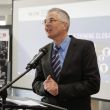Meet MSM’s faculty members: introducing Joris Stadhouders
Maastricht School of Management provides scientific knowledge allowing managers and entrepreneurs to make evidence-based decisions. To achieve our mission we encourage and support our faculty members in a broad range of areas. MSM’s faculty members are passionate about what they do and tenacious in finding solutions to the toughest business challenges. Each month MSM will highlight one of its faculty members and this month the spotlight is on Joris Stadhouders.
Let me introduce myself…
My name is Joris Stadhouders (Dutch) and I am an Assistant Professor for Management Information Systems (MIS) at MSM. I hold a Bachelor in Mathematics from Delft University and a Master in Technology Management from Eindhoven University. Before joining MSM I worked as an Automation Expert for the Netherlands Economic Institute (NEI, now called ECORYS) in Rotterdam. At NEI I was responsible for the Information Systems of different large development projects operating in Latin America). This also entailed extensive data collection and subsequent statistical analysis for the purpose of planning, evaluation and monitoring.
I started my career at MSM in the 1990s. During that period MSM developed its international partner network through joint MBA programs in countries like Singapore, Indonesia, Malaysia and China. Since then I have been lecturing different technology and management related subjects worldwide, for example MIS, business statistics and supply chain management. Furthermore I have been involved with master thesis supervision, project consultancy and management of MSM’s executive programs.
How do we incorporate technologies in our education programs….
The character of our school allows us to develop and quickly roll out master program courses related to management areas where new technologies play a major enabling role. Think for instance about “management decision making” using new data analytics tools. Also think about a subject like “digital transformation”, one that not only touches upon enabling technologies such as mobile computing, social media, big data and cloud computing, but also upon the associated value propositions and business models that are sustained, renewed or created. The course addresses issues beyond the technology itself: vision, strategy, structure, business processes and people’s roles. After all it is about leadership and management: how to change the organization and how to make the technologies truly work, how to make the business perform better.
New technologies and business models are not only visible in our master programs, they are also visible in our executive education programs. One of these programs is the E-Government program which will run in April 2018. The first part of the program focuses on digital strategies and policies for governmental entities in order to achieve a better government. The second part will highlight the technologies that can leverage a digital government in which data analytics is one of the core topics.
Using new technologies in education as a whole…..
New technologies do not only play a role in our program subjects. We also aim to integrate new technologies effectively in the education process and so enhance the learning process: by providing online materials using new media, by online interaction, and by providing more personalized feedback. This will ease the learning: allowing students to learn more in a shorter period of time and increasing the flexibility for students to decide when and where they would like to learn.
My ambition for the future is….
My research interest lies in the field of System Dynamics. System Dynamics has been adopted widely by academics in fields ranging from Biology to Sociology. Although leading management consulting firms use it to analyze their clients’ strategies, we cannot witness wide adoption by businesses themselves. They are often guided by spreadsheet based models for strategic planning. My ambition is to further develop education programs on management decision making, based on IT based system thinking tools. So that businesses can adopt these approaches for strategic analysis and planning, approaches that are more relevant in a dynamic world, and so become more sustainable.
There is always an opportunity to learn, not only for the students, also for me….
I find the internationally oriented environment of MSM truly inspiring: outside of class, working with international colleagues, as well as in class, working with international participants. Working with people, from different cultures, with different backgrounds, is fascinating and is also a great opportunity for learning, whether in my role as a colleague, lecturer, thesis supervisor or program manager.
Concluding remark…
It is important to add that MSM students, wherever they study in our global programs, can be characterized as being highly motivated, motivated to learn and motivated to improve. Not only motivated to improve their own career development and their organization, but also motivated to better serve society and their country. This makes me even more motivated as lecturer. This is why working at MSM is truly rewarding.
Related news
Meet MSM’s Faculty members: introducing Ms. Terry Kakeeto-Aelen
Meet MSM’s Faculty members: introducing Dr. Stephanie Jones
Meet MSM’s Faculty members: introducing Diederik de Boer
Meet MSM’s Faculty members: introducing Mirjana Stanisic
E-Government at MSM: How to lead E-Government Projects
MSM’s Research themes
MSM’s Publications

